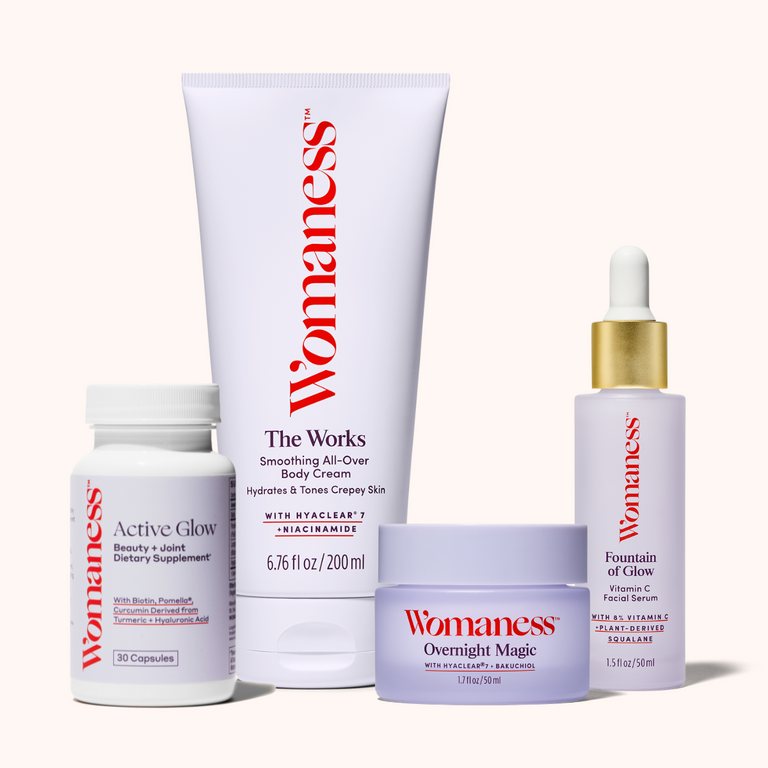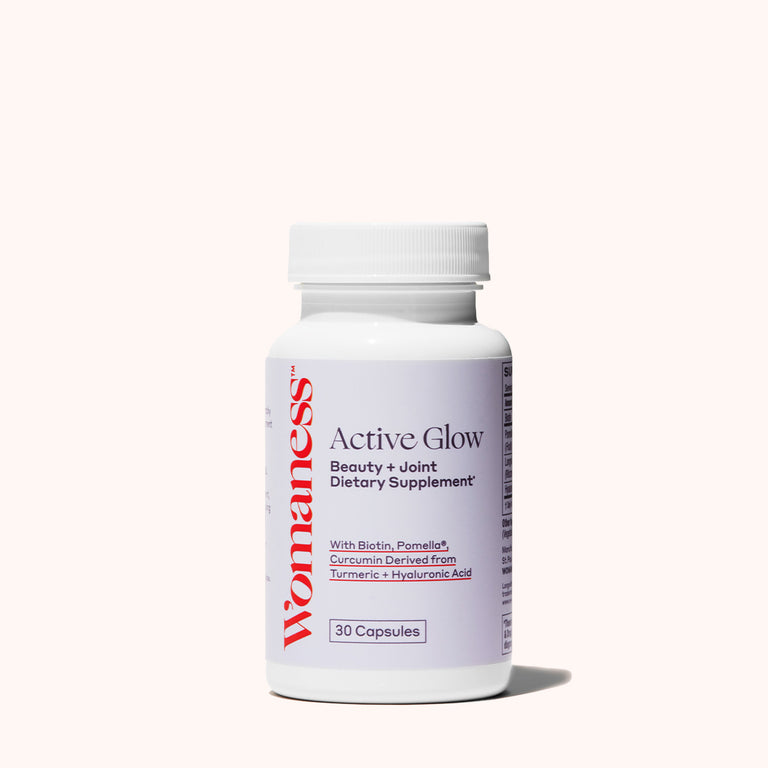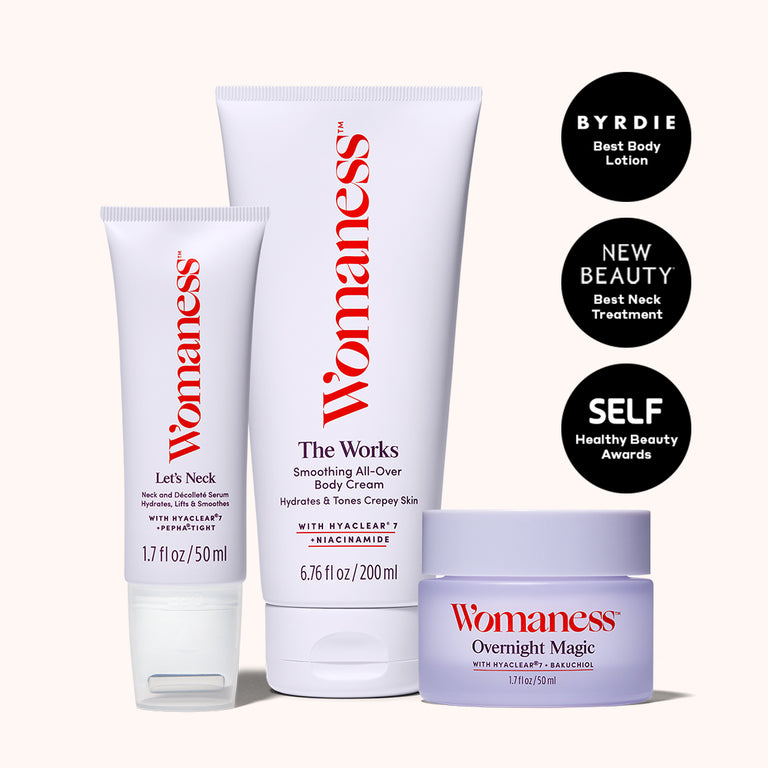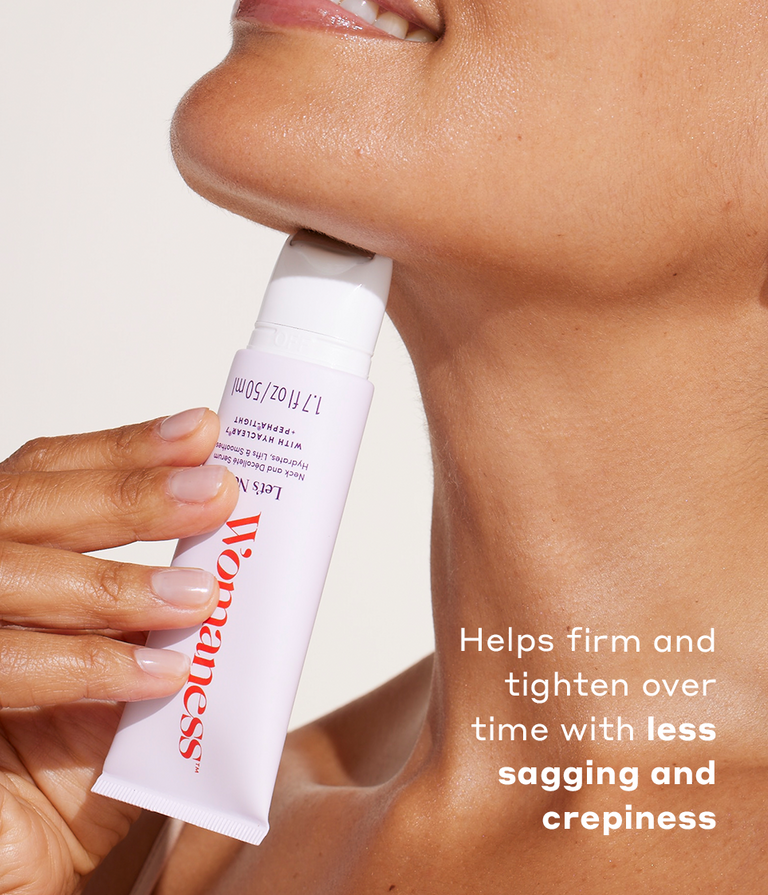By Julia Walker, RN, BSN 7-Minute Read

Julia Walker, RN, BSN is a women's health nurse, writer, and member of the perry team. Perry connects and supports perimenopause warriors in a safe space to build friendships, learn, and laugh. The moment you think, “WTF, could this be menopause?”—join our sisterhood!
Estrogen levels affect every cell in your body. So when you experience changes in those levels—as you do in perimenopause and menopause—it can affect every body system...including your hair, skin, and nails. Below, find out why these shifts happen and what you can do to embrace and enhance your ever-evolving appearance.
Skin Changes in Perimenopause & Menopause
The skin is the largest organ in the human body. It protects you from foreign invaders like toxins and bacteria, and it helps regulate moisture and body temperature. But, like all organs, your skin undergoes several changes as you age. And for women, those changes can become more apparent once hormone levels start to change in perimenopause.
Loss of Plumpness
One of the more prominent roles estrogen plays for your skin is helping to keep it plump. Collagen is the primary ingredient that keeps skin firm. However, when estrogen levels begin to wane, collagen production tapers off. Thus, the skin can start to lose its structure, volume, and tightness.
Tip to stimulate collagen:
Not that you ever need an excuse to get a facial, but facial massage can help increase blood flow and collagen production, which in turn can help your skin feel more plump and healthy. (It's a win-win, in our opinion!)
Dryness
Estrogen also plays a role in water retention. When women enter perimenopause, they often notice drier and even itchier skin (not to mention allergies, which can show up in this phase as well). Your skin can therefore become more sensitive to products you use, and you may even find you can no longer tolerate certain products you've used for years.
Tips to reduce dryness and itching:
-
Be kind when cleansing your skin by using gentle, non-irritating ingredients.
-
Drink plenty of water.
-
Take warm, short showers as opposed to hot, long ones. Hot water strips your skin of the natural oils that keep it healthy and hydrated. Be sure to follow up with a good moisturizer. Bonus points if it has hyaluronic acid, which optimizes moisture and firmness.
Spots of Darker Pigmentation
Often referred to as "age spots," dark spots can pop up anywhere on your skin but are especially common on the hands, arms, and face—any area that frequently gets sun exposure. These spots are usually harmless, but many women wish to see them disappear.
Tips for dark spots:
-
As with any unusual skin lesion, consult with your dermatologist first. If you get the a-okay, consider at-home treatment with a dark spot remover or ask your dermatologist to prescribe a treatment that helps with their removal. Or, wear them with pride!
-
Oh, and don't forget the sunscreen. It's your best friend against premature wrinkling and sun damage.
“Don't forget the sunscreen. It's your best friend against premature wrinkling and sun damage.”
Acne
Thought you kissed it goodbye after puberty and pregnancy? Think again. Acne has a way of popping back up when you least expect it. And in all honesty, many women experience acne on and off across adulthood.
Tips for combatting acne:
-
If you struggle with frustrating breakouts, don't reach for the strong over-the-counter acne cleanser at your local drug store. Many of these products are too intense for a woman's skin in perimenopause and beyond, so opt for a gentle cleanser that contains salicylic acid.
-
If adding that to your regimen doesn't work, reach out to your dermatologist for a personalized plan.
Hair Changes in Perimenopause & Menopause
One of the more surprising and discomforting signs of entering a new season in life is hair thinning and brittleness. Your hair is an extension of your integumentary system (i.e., the skin). While it is admittedly significant for most women in terms of looks and self-identity, it actually serves little purpose at this point in our human evolution (although sun protection is a big help in protecting our scalps!).
Hair Loss in Menopause
Once perimenopause begins and estrogen levels taper off, many women lose hair thickness and density. In general, most women will start to notice some hair thinning by age 50. However, certain circumstances and conditions may exacerbate your losses.
“Most women will start to notice some hair thinning by age 50.”
For example, most people will experience telogen effluvium at some point, when you temporarily lose a large amount of hair in response to stress. Women who have been through postpartum may know what it's like, as do people who've had surgery or gone through severe emotional stress (such as losing a loved one). It's not uncommon to experience telogen effluvium if you have high stress levels during menopause while experiencing its big hormone fluctuations.
In addition, a study on biotin and female hair loss showed a biotin deficiency in 38% of women with hair loss. In the study, only 13% of the women with hair loss had optimal biotin levels.
Another thing to watch for is androgenic alopecia or female pattern hair loss. Like men, women can lose hair permanently, although hair loss occurs in a different pattern than men. Typically, women notice their part line begin to widen or their hair thin near the temples. This condition often turns up in women in their 40s and frequently travels in families, so look to your family tree to see if anyone else is struggling with hair loss.
Tips for hair loss in menopause:
-
If you have hair loss, see your dermatologist. The sooner you act and understand what's causing it, the sooner you can properly treat it.
-
Ensure your diet is up to snuff. Hair growth requires protein, iron, and vitamins, so pack your plate with plenty of protein sources, whole veggies, and fruits.
- Consider supplementing with biotin to support any hair loss.
Brittleness
Changes in your hair texture are common in menopause. However, some changes can be prevented, especially if you love to style your hair every day.
Tips for brittleness in menopause:
-
Avoid (or at least take a break from) harsh hair-styling methods that wreck the cuticle or outer protective layer of your hair. That means setting aside the curling iron or flat iron a few times a week to give your tresses a breather.
-
Look for products that help bring moisture back into your hair while repairing damaged strands.
-
If you are a regular at the salon for hair color, talk to your stylist about enhancing your natural hue. Owning your gray hair has never been more popular, and more and more women are embracing sexy, silvery streaks (hello!).
“Owning your gray has never been more popular; more and more women are embracing sexy, silvery streaks (hello!).”
Nail Changes in Perimenopause & Menopause
Just like your hair, your nails can become thinner and more brittle. Dropping estrogen levels can weaken the keratin layer that makes nails hard, causing them to weaken. Lack of water, which lowers estrogen levels, can also weaken your nails.
Tips for combatting weak, brittle nails:
-
Watch what you put on your hands. If you soak your hands in harsh detergeants while cleaning the kitchen, for example, using a pair of reusable gloves can help.
-
Stay on top of hydration and eat a diet high in protein and omega-3 fatty acids to give your nails the right ingredients for healthy growth.
-
End your nightly routine with a gentle, non-irritating hand or body moisturizer to help alleviate cracking around the nail beds.
More For You
7 Nutrients for Healthy Hair, Skin, and Nails in Menopause
7 Beauty Tips for Dry Menopausal Skin
Ingredient Spotlight: Vitamin C




